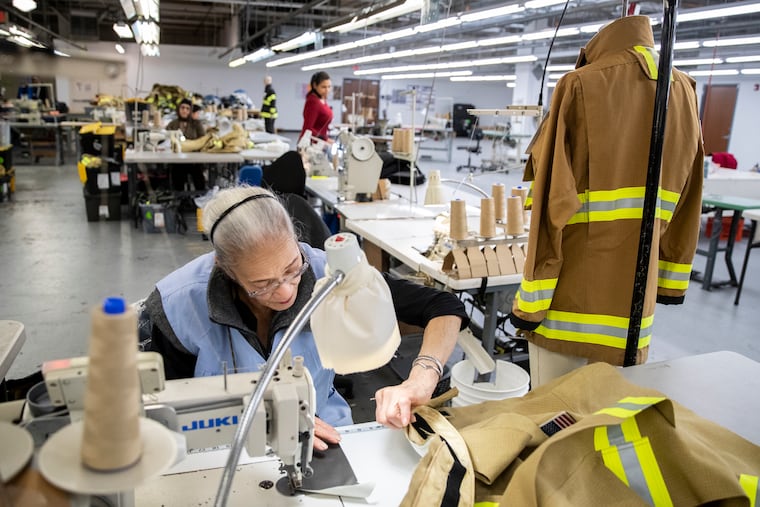A Philly company that makes protective gear for firefighters is expanding to fulfill its part of a $40 million Air Force contract
At a historic complex in North Philly, Ricochet's workers make gear that’s worth hundreds of dollars apiece.

Manufacturing is coming back, says Peter Askey.
Like some other Philadelphia factory owners, he’s looking for workers, as his garment company, Ricochet, based in Philadelphia’s old industrial Nicetown section, expands after winning the largest share of a $40 million Air Force firefighter equipment contract.
The work will be spread over the next six years at Ricochet’s headquarters, which is in the historic former Philco-Ford appliance complex that was an anchor of the city’s vanished electrical-manufacturing industry.
Now staffed by 80 workers, Ricochet employs residents of nearby neighborhoods and immigrants from around the globe. There’s a manager from Colombia and a design leader from India who studied at Philadelphia University, the city’s former textile college, now part of Thomas Jefferson University. Other employees are from Afghanistan, Egypt, the Caribbean, Central and South America, China, and Vietnam.
Inside the factory, under a high ceiling, workers use a range of hand tools, sewing machines, and sophisticated digitally controlled devices to design, cut, sew, and heat-weld dozens of heavy-duty emergency-responder coats and trousers. The garments, worth hundreds of dollars each, are made from heat-, liquid-, pathogen-, and toxin-resistant fabrics that Ricochet sources from W.L. Gore, Delaware-based maker of Gore-Tex, as well as other specialty textile makers.
Under the new contract, Ricochet is the exclusive supplier of what firefighters call “turnout gear,” providing flame-resistant coats and pants to Air Force first responders. Kentucky-based Bullard will make the helmets.
Askey says he expects to employ more than 100 workers by summer’s end. That’s triple Ricochet’s workforce back in 2017, when it won a piece of an earlier Air Force contract in partnership with two larger companies, after 18 years supplying gear to fire companies across the country.
Ricochet starts workers at $14-$15 per hour and raises skilled veterans into the $20s — double and triple Pennsylvania’s $7.25-an-hour minimum wage, which is below those of the six neighboring states.
A historic switch
Ricochet’s recent growth is part of a larger trend. Spending to build and expand U.S. factories and other manufacturing sites hit a record high of $108 billion last year, up from $79 billion in 2021, a gain far in excess of inflation, according to U.S. Census data.
Factory operators complain they can’t find workers to build all the products they have orders to make, even though once-routine and labor-intensive processes are increasingly automated and robotized. Factory employment in recent years has occupied a steady one-tenth of the private-sector of the U.S. workforce, which totals around 133 million people.
The jump in factory-building follows Biden and Trump administration policies of promoting U.S. industrial revival by demanding more U.S. production for military and other government contracts, limiting and taxing strategic imports, and subsidizing computer-chip and car-battery makers, among other favored industries.
Many successful U.S. factories, like Ricochet with its Air Force gear and Boeing’s 4,000-worker Ridley Park helicopter factory, benefit from rules that require the military and other federal agencies to buy products made in the U.S., which sometimes encourage hiring small, urban, and diverse businesses.
Clothing manufacturers find profitable niches
In addition to helping reinvent Philly’s manufacturing history, Ricochet is also a modern outpost of the region’s clothing industry, which lost many of its largest employers as factories moved South and then overseas, beginning in the 1960s.
Other Philadelphia clothing makers that have found profitable niches despite the long offshoring trend include what Askey calls “friendly competitor” military-fabrics maker Ehmke Manufacturing in Feltonville, Boathouse Sports on Hunting Park Avenue, running-shoe maker Garrixon in the Northeast, Cool Compression sports-gear maker Lontex Corp. in Norristown, and the Majestic sports-gear factory in Easton, which makes Major League Baseball uniforms and is owned by Fanatics’ Michael Rubin.
Ricochet was founded in 1999 by Bill and Lillie Lord and initially made flight suits and chemical-protection suits before adding emergency gear.
Ricochet’s survival wasn’t guaranteed when Askey took over the company in 2014.
The Princeton grad worked in investment banking before becoming the head of DVCRF Ventures, a small-manufacturer-focused investment fund founded by the late Joseph Killackey of the Reinvestment Fund, a Philadelphia-based nonprofit lender.
Most of the companies associated with the fund found ready buyers, recouping DVCRF’s investment. But in 2014, when the group was unable to find a buyer for Ricochet, “the board said, ‘Shut em down,’ ” Askey recalls.
So he agreed to buy Ricochet himself. After financing so many deals, including stints as a short-term manager at portfolio companies, “I was dying to run a company — dealing with people, hiring, and managing. I knew I could make it profitable,” he said.
He convinced Reinvestment Fund directors to lend him $50,000 — the amount he estimated it would have cost to close Ricochet — to help keep the company going. He joined the Manufacturing Alliance of Philadelphia and other business owners’ and fire-industry groups, seeking guidance.
“We cut our teeth on small-batch stuff,” making suits for fire units in Philadelphia and other cities and towns, he added. He studied Pentagon small-business set-aside rules and convinced larger contractors to include Ricochet in that first Air Force contract in 2017.
Now, to help finance the ongoing expansion, he’s lined up additional capital from wealthy area residents. “I didn’t want a private-equity firm,” which would likely press for fixed profit and asset-sale timetables, and increase the likelihood the company would be sold or consolidated elsewhere.
He’s looking forward to showing the Air Force and its larger contractors how Ricochet handles larger production, so it can keep seeking bigger jobs, hiring more people, and building up the city where it has begun to prosper.